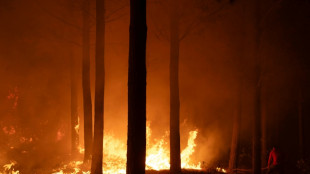
-
 Spaniard condemns 'ignorant drunks' after Melbourne confrontation
Spaniard condemns 'ignorant drunks' after Melbourne confrontation
-
Philippines to end short-lived ban on Musk's Grok chatbot

-
 Police smash European synthetic drug ring in 'largest-ever' op
Police smash European synthetic drug ring in 'largest-ever' op
-
Japan to restart world's biggest nuclear plant Wednesday

-
 South Korean ex-PM Han gets 23 years jail for martial law role
South Korean ex-PM Han gets 23 years jail for martial law role
-
Alcaraz, Sabalenka, Gauff surge into Australian Open third round

-
 Over 1,400 Indonesians left Cambodian scam groups in five days: embassy
Over 1,400 Indonesians left Cambodian scam groups in five days: embassy
-
Raducanu to 're-evaluate' after flat Australian Open exit

-
 Doncic triple-double leads Lakers comeback over Nuggets, Rockets down Spurs
Doncic triple-double leads Lakers comeback over Nuggets, Rockets down Spurs
-
Bangladesh will not back down to 'coercion' in India T20 World Cup row

-
 Alcaraz comes good after shaky start to make Australian Open third round
Alcaraz comes good after shaky start to make Australian Open third round
-
Trump departs for Davos forum again after switching to new plane: AFP

-
 Impressive Gauff storms into Australian Open third round
Impressive Gauff storms into Australian Open third round
-
Dazzling Chinese AI debuts mask growing pains

-
 Medvedev battles into Melbourne third round after early scare
Medvedev battles into Melbourne third round after early scare
-
Denmark's Andresen upstages sprint stars to take Tour Down Under opener

-
 Turkey's Sonmez soaks in acclaim on historic Melbourne run
Turkey's Sonmez soaks in acclaim on historic Melbourne run
-
Sheppard leads Rockets to sink Spurs in Texas derby

-
 Sabalenka shuts down political talk after Ukrainian's ban call
Sabalenka shuts down political talk after Ukrainian's ban call
-
Trump's plane returns to air base after 'minor' electrical issue: White House

-
 Barcelona train crash kills 1 in Spain's second deadly rail accident in days
Barcelona train crash kills 1 in Spain's second deadly rail accident in days
-
North produces enough nuclear material a year for 10-20 weapons: S. Korea president

-
 Japan ex-PM Abe's alleged killer faces verdict
Japan ex-PM Abe's alleged killer faces verdict
-
Climate change fuels disasters, but deaths don't add up

-
 Stocks stable after tariff-fuelled selloff but uncertainty boosts gold
Stocks stable after tariff-fuelled selloff but uncertainty boosts gold
-
What growth?: Taiwan's traditional manufacturers miss out on export boom

-
 'Super-happy' Sabalenka shines as Alcaraz gets set at Australian Open
'Super-happy' Sabalenka shines as Alcaraz gets set at Australian Open
-
With monitors and lawsuits, Pakistanis fight for clean air

-
 Sabalenka sets up potential Raducanu showdown at Australian Open
Sabalenka sets up potential Raducanu showdown at Australian Open
-
Chile president picks Pinochet lawyers as ministers of human rights, defense

-
 Osaka says 'I'm a little strange' after Melbourne fashion statement
Osaka says 'I'm a little strange' after Melbourne fashion statement
-
UN report declares global state of 'water bankruptcy'

-
 Trump heads for Davos maelstrom over Greenland
Trump heads for Davos maelstrom over Greenland
-
Ukraine's Oliynykova wants Russian, Belarusian players banned from tennis

-
 Kasatkina cannot wait to be back after outpouring of Melbourne support
Kasatkina cannot wait to be back after outpouring of Melbourne support
-
Chile blaze victims plead for help from razed neighborhoods

-
 Russian minister visits Cuba as Trump ramps up pressure on Havana
Russian minister visits Cuba as Trump ramps up pressure on Havana
-
World order in 'midst of a rupture': Canada PM Carney tells Davos

-
 Senegal's 'historic' AFCON champs honoured with parade, presidential praise
Senegal's 'historic' AFCON champs honoured with parade, presidential praise
-
Audi unveil new car for 2026 Formula One season

-
 Man City humiliated, holders PSG stumble, Arsenal remain perfect
Man City humiliated, holders PSG stumble, Arsenal remain perfect
-
Vinicius, Real Madrid need 'love' not whistles: Bellingham

-
 Late Suarez winner stops Champions League holders PSG in Lisbon
Late Suarez winner stops Champions League holders PSG in Lisbon
-
Frank seeks Spurs 'momentum' after beating Dortmund

-
 Jesus' 'dream' brace at Inter fires Arsenal into Champions League last 16
Jesus' 'dream' brace at Inter fires Arsenal into Champions League last 16
-
US regulator appeals Meta's court victory in monopoly case

-
 Netflix shares fall as revenue appears to stall
Netflix shares fall as revenue appears to stall
-
Tottenham beat 10-man Dortmund to hand Frank stay of execution

-
 Mbappe, Vinicius help Real Madrid thrash Monaco in Champions League
Mbappe, Vinicius help Real Madrid thrash Monaco in Champions League
-
Men's Fashion Week kicks off in Paris with Louis Vuitton show


Scientists warn entire branches of the 'Tree of Life' are going extinct
Humans are driving the loss of entire branches of the "Tree of Life," according to a new study published on Monday which warns of the threat of a sixth mass extinction.
"The extinction crisis is as bad as the climate change crisis. It is not recognized," said Gerardo Ceballos, professor at the National Autonomous University of Mexico, and co-author of the study published in Proceedings of the National Academy of Sciences (PNAS).
"What is at stake is the future of mankind," he told AFP.
The study is unique because instead of merely examining the loss of a species, it examines the extinction of entire genera.
In the classification of living beings, the genus lies between the rank of species and that of family. For example, dogs are a species belonging to the genus canis -- itself in the canid family.
"It is a really significant contribution, I think the first time anyone has attempted to assess modern extinction rates at a level above the species," Robert Cowie, a biologist at the University of Hawaii who was not involved in the study, told AFP.
"As such it really demonstrates the loss of entire branches of the Tree of Life," a representation of living things first developed by Charles Darwin.
The study shows that "we aren't just trimming terminal twigs, but rather are taking a chainsaw to get rid of big branches," agreed Anthony Barnosky, professor emeritus at the University of California, Berkeley.
- 73 extinct genera -
The researchers relied largely on species listed as extinct by the International Union for Conservation of Nature (IUCN). They focused on vertebrate species (excluding fish), for which more data are available.
Of some 5,400 genera (comprising 34,600 species), they concluded that 73 had become extinct in the last 500 years -- most of them in the last two centuries.
The researchers then compared this with the extinction rate estimated from the fossil record over the very long term.
"Based on the extinction rate in the previous million years we would have expected to lose two genera. But we lost 73," explained Ceballos.
That should have taken 18,000 years, not 500, the study estimated -- though such estimates remain uncertain, as not all species are known and the fossil record remains incomplete.
The cause? Human activities, such as the destruction of habitats for crops or infrastructure, as well as overfishing, hunting and so on.
The loss of one genus can have consequences for an entire ecosystem, argued Ceballos.
"If you take one brick, the wall won't collapse, he said. "You take many more, eventually the wall will collapse.
"Our worry is that ... we're losing things so fast, that for us it signals the collapse of civilization."
- 'Still time' to act -
All experts agree that the current rate of extinction is alarming -- but whether this represents the start of a sixth mass extinction (the last being the asteroid that wiped out the dinosaurs 66 million years ago) remains a matter of debate.
Scientists broadly define a mass extinction as the loss of 75 percent of species over a short period of time. Using that "arbitrary" definition, Cowie said, a sixth mass extinction has not yet occurred.
But if we assume that "species will continue to go extinct at the current rate (or faster), then it will happen," he warned. "We can surely say that this is the beginning of a potential sixth mass extinction."
Ceballos warned that the window of opportunity for humans to act is "rapidly closing."
The priority is to halt the destruction of natural habitats, and to restore those that have been lost, he said.
"But there is still time to save many genera," he said. "There are 5,400 genera, we can save many of them if we act now."
W.Huber--VB




